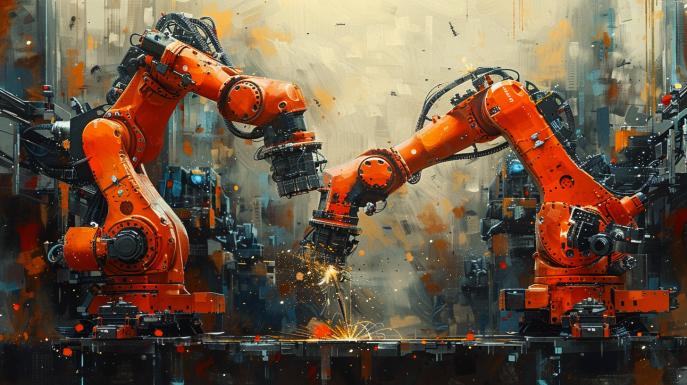Imagine a world where productive efficiency is no longer a goal, but an everyday reality. At the heart of this scenario, robotics is advancing by leaps and bounds, reshaping the landscape of factories around us. In “[Everyday Robotics and the Future of Factories],” we explore how the use of robots in manufacturing is not only revolutionizing industry, but also redefining the meaning of industrial automation. Follow us and discover the surprising impacts that robots are having on the economy and the job market, reflecting on the future that is already being built today.
How Robotics Are Transforming the Manufacturing Industry?
Recent advances in robotics on the industrial production line include improvements in precision, speed and uninterrupted work capability. With the use of robots in manufacturing, there is a substantial increase in production efficiency. Industrial automation not only speeds up processes but also reinforces safety, removing workers from high-risk activities.
In the economy, automation can reduce production costs and influence final prices, but it also impacts the labor market, where the movement of workers to new areas is necessary. The transformation of factories thanks to robotics is imminent; Investing in training is essential for the future of work.
The Robot Revolution in Agriculture and Logistics: What are the Implications?
Drones and autonomous tractors are revolutionizing agriculture by optimizing crop production by maximizing crop efficiency and reducing waste. They enable more precise control over sowing, irrigation and harvesting, directly impacting productivity and environmental sustainability. In logistics, with an increasingly vital role in e-commerce, specialized robots guarantee more efficient inventory management and the rapid preparation and delivery of orders, essential in services such as Amazon, which offers delivery options to the same or next day. Both scenarios exemplify how autonomous systems are becoming fundamental in the day-to-day operations of these industries, promising significant transformations in the way we manage food and commodity production.
Robots in the Health and Services Sector: What's New?
Innovations in medical robots, such as Da Vinci Surgical System, have allowed minimally invasive surgical procedures, offering patients faster recovery with a lower risk of infection. In the service area, service robots are beginning to transform the customer experience in hotels and restaurants; they interact and deliver food, raising the level of service and reducing labor costs. Automation technology, in this context, highlights not only the efficiency and productivity enhanced by robots in medicine It is robots in the service sector, but also the new horizons of humanization and personalization of customer service.
Human-Robot Interaction and Ethics in Automation: How Are We Evolving?
Industries are witnessing a significant advancement in human-robot collaboration, where intelligent and adaptive robots work side by side with humans. This technological symbiosis improves efficiency while robotics training expands to ensure the safety and effectiveness of the human workforce. With ethical issues emerging, it is essential to debate responsibility and morality in robotics, aiming for equitable and conscious automation.
Robotics in Everyday Life and the Future of Factories
The use of robots in manufacturing is transforming the landscape of modern factories. On the factory floor, they not only increase production efficiency but also reinforce worker safety. These advances mean that repetitive and dangerous tasks are now delegated to robots, allowing workers to focus on more strategic and less risky roles.
As a result, industrial automation gains momentum. According to a report by the International Federation of Robotics, the demand for automation in several industries continues to grow. Robots now carry out tasks with a level of speed and precision beyond human capability, leading to higher production rates and lower possibilities of errors.
However, intense automation has economic and labor market consequences, highlighting the urgent need to retrain professionals to coexist productively in this new technological environment.
Throughout this article, we explore the transformative impact of robotics on various sectors, highlighting the continuous advancement in efficiency, safety and precision. We discuss the innovations reshaping manufacturing, agriculture, logistics, healthcare and services, as well as the ethical challenges that arise alongside these technologies. The potential to revolutionize the economy and the job market is undeniable, as is the need for human adaptation to this new reality. Robotics is not only redefining industries but also invites us to reflect on the future of human-robot collaboration and ethics in an era of advanced automation.
FAQ
Common questions:
What are the benefits of using robots in the manufacturing industry?
Robots have brought advances such as greater precision and speed in production lines, enabling continuous work and substantially increasing production efficiency. Robotics also contributes to worker safety, removing them from high-risk activities.
How are robotics influencing agriculture and logistics?
In agriculture, drones and autonomous tractors are optimizing production by increasing crop efficiency and reducing waste. In logistics, specialized robots improve inventory management and speed up the preparation and delivery of orders, something increasingly necessary in times of accelerated e-commerce.
How are robots transforming the healthcare and services sector?
Robots are used in minimally invasive surgical procedures, allowing faster recoveries and reducing the risk of infection. In the service sector, service robots are transforming the customer experience in hotels and restaurants, offering interactions and deliveries efficiently and reducing labor costs.
How important is it to discuss ethics in relation to advances in automation and robotics?
With increasing collaboration between humans and intelligent robots, important ethical concerns are emerging that must be discussed. Issues of responsibilities and morality need to be debated to achieve equitable and conscious automation, ensuring that advances benefit everyone.
What impact can robotics have on the future of the job market?
Robotics is changing the nature of work, causing repetitive and dangerous tasks to be performed by machines, while workers are shifted to strategic roles. This highlights a growing need for retraining professionals so that they can coexist productively with the new technological reality in factories.



